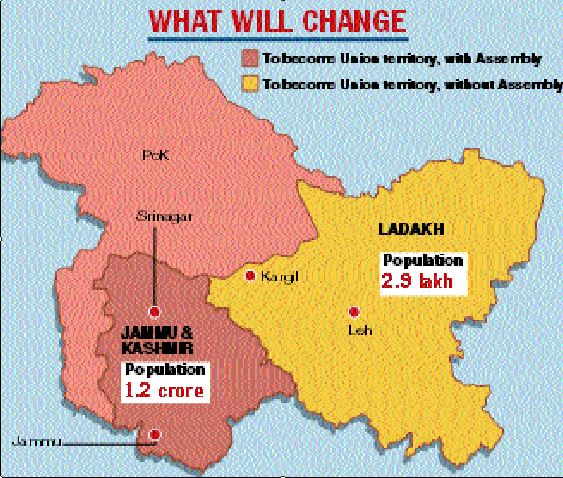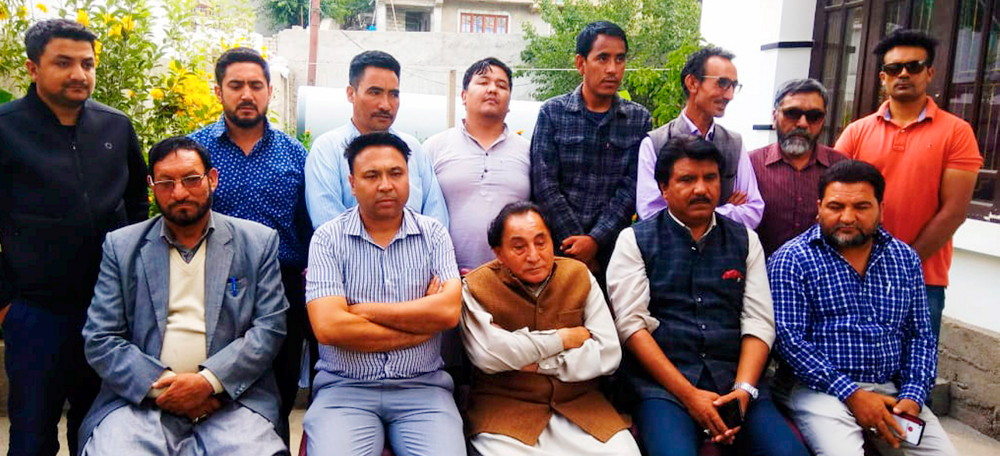Much of the country is divided on the special status to Jammu and Kashmir. For every argument against Article 370, there is one in its favour:
‘Temporary’ feature
Argument against Article 370: The very nomenclature of the Article in the Constitution of India, 1949, says it is a “temporary” provision.
Article 370(3) clearly empowers the President to declare by a notification that this article shall cease to be operative or shall be operative only with such exceptions and modifications and from such date as the President may specify. It is this provision that the government has invoked.
Argument for Article 370: The interpretation of Article 370(3), which is cited to argue this is a temporary measure, will now be subject to judicial challenge and review. This is because Article 370(3), even while granting the President the power to render the article inoperative, says “the recommendation of the Constituent Assembly of the State referred to in clause (2) shall be necessary before the President issues such a notification”.
In other words, the President cannot scrap the provision without the recommendation of the Constituent Assembly of the state, which in any case stood dissolved in the mid-1950s after drafting the state Constitution. Since there is no Constituent Assembly, the Centre should ideally have made a presidential reference to the Supreme Court for a clarification.
Article 143 of the Constitution says that “if at any time it appears to the President that a question of law or fact has arisen, or is likely to arise, which is of such a nature and of such public importance that it is expedient to obtain the opinion of the Supreme Court, he may refer the question to that court for consideration and the court may, after such hearing as it thinks fit, report to the President its opinion thereon”.
Why special?
Against 370: When Kashmir is an “integral part of India”, as held by even the family of Sheikh Abdullah, what is the difficulty in integrating it with India fully? The special status has meant that the Centre could exercise its powers only on matters relating to defence, external affairs, communications and finance. In the remaining areas, the state government alone called the shots.
For 370: Jammu and Kashmir was granted special status because of its unique historical and cultural identity. Kashmiris could have joined either Pakistan or India, but had chosen to remain independent.
It was because of fears of imminent annexation by Pakistan that Kashmir, instead of remaining a buffer state, opted for limited Indian government control subject to the provisions of Article 370, which guaranteed it a unique status within India.
The special status was a condition agreed upon by the Indian government for the state’s annexation and cannot be temporary.
Laws don’t apply
Against 370: Neither the Indian Constitution nor parliamentary enactments, including the Indian Penal Code or statutory provisions, apply in the state although it is an integral part of India.
For 370: Although the Indian Penal Code is not applicable to Jammu and Kashmir, the Ranbir Penal Code in force in the state has penal provisions similar to the IPC.
Has not helped
More than 72 years of special status has not in any way improved living conditions or the law-and-order situation in the state. Thousands of civilians and army and paramilitary personnel, besides militants, get killed every year. The situation continues to go from bad to worse with no political solution in sight.
Permanent: HC
The constitutionality of Article 370 had not been determined by the Supreme Court but Jammu and Kashmir High Court had in October 2015 held that Article 370, though included in Part XXI of the Constitution and titled “Temporary, Transitional and Special Provisions”, had assumed a place of permanence in the Constitution.
“It is beyond amendment, repeal or abrogation, in as much as the Constituent Assembly of the state before its dissolution did not recommend its amendment or repeal,” a two-judge bench of the high court had ruled.
Further, the high court had held that the President under Article 370(1) is conferred with the power to extend any provision of the Constitution to the state with such “exceptions and modifications” as may be deemed fit, subject to consultation or concurrence with the state government.
The high court had passed the order while dealing with certain promotion-related disputes involving employees in the state government.
The order had been challenged by the aggrieved employees in the Supreme Court, which is yet to decide on the matter.
THE PRESIDENT’S NOTIFICATION
The following is the text of the President’s notification on Article 370
In exercise of the powers conferred by clause (1) of article 370 of the Constitution, the President, with the concurrence of the Government of State of Jammu and Kashmir, is pleased to make the following Order:
1. (1) This Order may be called the Constitution (Application to Jammu and Kashmir) Order, 2019.
(2) It shall come into force at once, and shall thereupon supersede the Constitution (Application to Jammu and Kashmir) Order, 1954 as amended from time to time.
2. All the provisions of the Constitution, as amended from time to time, shall apply in relation to the State of Jammu and Kashmir and the exceptions and modifications subject to which they shall so apply shall be as follows:
To article 367, there shall be added the following clause, namely: “(4) For the purposes of this Constitution as it applies in relation to the State of Jammu and Kashmir-
(a) references to this Constitution or to the provisions thereof shall be construed as references to the Constitution or the provisions thereof as applied in relation to the said State;
(b) references to the person for the time being recognized by the President on the recommendation of the Legislative Assembly of the State as the Sadar-i-Riyasat of Jammu and Kashmir, acting on the advice of the Council of Ministers of the State for the time being in office, shall be construed as references to the Governor of Jammu and Kashmir;
(c) references to the Government of the said State shall be construed as including references to the Governor of Jammu and Kashmir acting on the advice of his Council of Ministers; and
(d) in proviso to clause (3) of article 370 of this Constitution, the expression “Constituent Assembly of the State referred to in clause (2)” shall read “Legislative Assembly of the State”.
RAM NATH KOVIND,
President

Matter sub judice
Propriety demands that when a matter is pending in the Supreme Court, the government should not take a major policy decision like scrapping the state’s special status.
Apart from the appeal that has challenged the high court’s verdict, the Supreme Court is seized of a batch of petitions filed by NGOs and individuals who have challenged the validity of Articles 370 and 35A.
The apex court had issued separate notices on the issue since 2015, but till date the NDA government had not made its position clear.
Last year, when the matter had come up for hearing, attorney-general K.K. Venugopal had sought an adjournment on the ground that the state was facing panchayat elections.
The court had adjourned the matter.
Again, on July 10, a bench headed by Chief Justice of India Ranjan Gogoi had agreed to examine the plea of advocate Ashwini Kumar Upadhyay for an early hearing of his petition to scrap Article 370.
“You file the memo of parties; we will see,”
Chief Justice Gogoi had told Upadhyay.
The petition is yet to come up for hearing.











